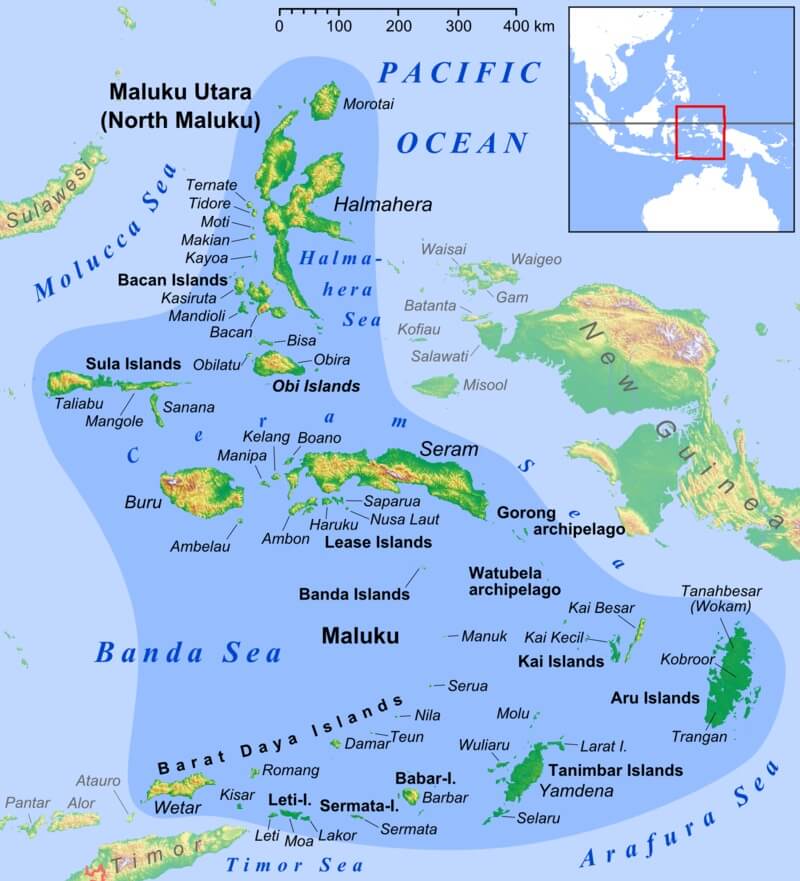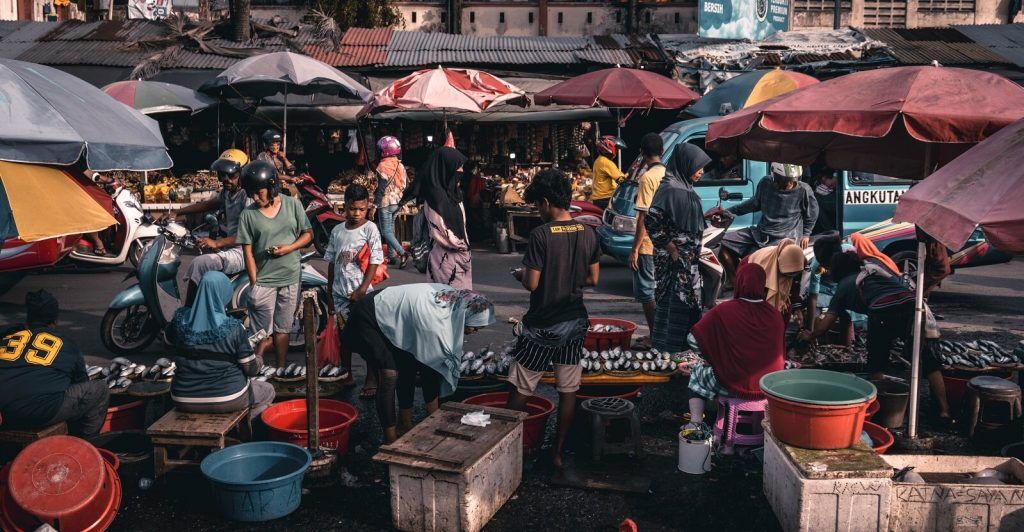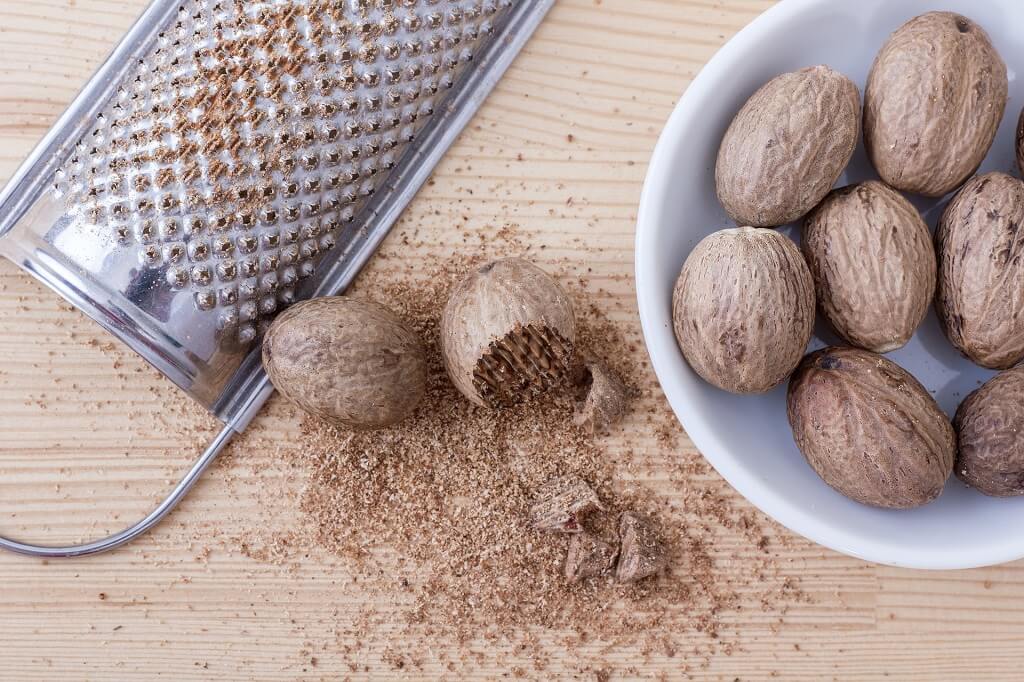A history of The Spice Islands
Understanding Spices
Your cart is empty.
SUBTOTAL
£0.00

Understanding Spices
“The Spice Islands” – the name given to the Moluccas or Maluku Islands in eastern Indonesia. This archipelago consists of over 1,000 islands with a total land mass of 75,000 square kilometres. From Indonesia’s independence in 1945, the Maluku Islands were a single province until 1999 when it was divided into two provinces. The new province, North Maluku, is largely Muslim and its capital, Sofifi is on Halmahera island. Maluku Province is predominantly Christian and its capital is Ambon.

The name ‘Spice Islands’ came about in the 16th century when the area became an important part of the trade routes. Although spices existed in Europe in the Middle Ages, they weren’t so readily available. The long and dangerous journeys to and from Asia made prices very steep. It was the desire for cheaper spices and seasonings that sparked the beginning of the spice trade.
The Moluccas were known for their nutmeg, mace and cloves, which were only native to these islands. Some of the most important islands were Ternate, Tidore, Ambon, Seram, Halmahera, Buru and the Kai and Aru island groups. The spice trade in the Moluccas flourished long before European traders arrived. Chinese silks, Indian cottons, Arabian coffee and African ivory were all used to buy spices.
The Arabs largely controlled the spice trade during the Middle Ages. They bought spices from the Moluccas as well as ginger from China and cinnamon from India. Between 1100 and 1400, the Arabs managed to keep the whereabouts of the Moluccas a secret, allowing them a monopoly over the spice trade. On their route back from the Spice Islands, the Arabs sold the spices to merchants in Venice. This deal made Venice a wealthy city as they could then sell the spices to the rest of Europe at their own inflated prices.
Out of the Europeans, the Portugese were first to arrive and set up several bases on the islands as early as 1512. This began a chaotic era of conflict that caused many losses of life. The Dutch, Spanish, Portugese and British were constantly bidding for control of the islands.
The first considerable dispute was between the Portuguese and the powerful sultanates of Ternate island and Tidore island. The Portuguese destroyed the capital of Ternate and built a fort in 1522. In 1574, the people of Ternate threw out the Portugese and the sultan granted the Dutch a spice monopoly. The Portuguese also built a fort in Tidore in 1578. However, the Spanish had a foothold in Tidore and helped turn the island against the sultan of Ternate and the Dutch. Despite this the Dutch took hold of Tidore in 1654.

Another significant dispute was the Dutch-Portugese War, also known as The Spice War. This took place between 1602 and 1663 and involved the Dutch East India Company and the Dutch West India Company against the Portugese Empire. The war was primarily concerned with Dutch companies invading Portugese colonies in Africa, India, the Americas and the Far East. At the time, the Eighty Years’ War was happening in Europe. This was a battle between Spain and the Netherlands and Portugal was in a dynastic union with Spain at the time. However, the Dutch-Portugese War had little to do with the situation in Europe. It was mostly a way for the Dutch to build their empire overseas and control trade. And they succeeded – the Dutch took control of Ghana, Malacca, Ceylon, Formosa and Indonesia.
During their time in the Moluccas, the Dutch attempted to restrict production in order to retain high prices, but this led to riots in 1650 and 1679 marking the beginning of the end of clove production in northern Moluccas. The sultan of Ternate became a vassal of the Dutch East India Company. Although the Dutch had control of Ternate until Indonesia gained independence, the spice trade had already largely dwindled towards the end of the 18th century.
Today, Ambon is still a thriving centre for the production of spice, alongside cocoa, coffee, fruit, fish, lobsters and pearls. Nutmeg and cloves are grown locally by small-scale farmers, who then sell them to village collectors. These are then sold on to exporters. Nutmeg can be used in sweet and savoury dishes and has a warm, spicy flavour. It enhances the flavour of many desserts such as pumpkin pie and many drinks such as mulled wine. Cloves are also used alongside nutmeg in drinks and desserts. They are also very useful additions to flavour meat, sauces and rice dishes.

You can still visit the Moluccas today and the best way to explore the archipelago is by boat. Despite its fascinating history, tourism hasn’t taken off on the islands. However, with traditional villages such as Moya and Gurabunga, the pristine beaches and volcanic mountain ranges, the islands are a haven for adventurous travellers looking to get off the beaten track.
Nicknamed the coral triangle, the islands are an excellent destination for diving as they’re home to vibrant coral reefs. Despite being a great diving spot, the area manages to escape the attention of divers travelling to Indonesia. The healthy reefs support some of the world’s highest numbers of coral and fish species, with new species being discovered to this day. Creatures that are often spotted include blue-spotted stingrays, bumphead parrotfish, gigantic Napoleon wrasse and whale shark.
Both the islands of Ternate and Tidore have many ruined forts left behind by the Europeans. Fort Tolukko on Ternate was initially built by the Portugese for the sultan of Ternate as defence against his rival, the sultan of Tidore. The island is also home to Fort Kastela, where you can see a monument featuring scenes of the Portugese governor Mesquita literally stabbing the sultan of Ternate in the back.
If you’re looking for a challenge, Ternate and Tidore both have volcanic peaks providing stunning views. On Ternate, the active Gamalama volcano has sulphur steams erupting from its crater. On Tidore, the Kie Matubu volcano is the highest point in North Maluku and boasts magnificent views of the other surrounding islands.
Understanding Spices
Spices have long been integral to the UK's culinary landscape, adding depth, flavours, and richness to a myriad of dishes. From the pungent aroma of cumin in Indian curries to...
Read MoreUnderstanding Spices
Confetti is an essential part of any wedding day. Not only is it a wonderful way to greet a newlywed couple, but it also provides some beautiful photo opportunities. The...
Read MoreSeasonal Ideas
It’s no secret that any handmade gift will always be more special than a store-bought one. Homemade food gifts are especially wonderful, a labour of love that shows someone you...
Read MoreHealth and Wellbeing
It’s no secret that winter’s cold and gloomy weather makes us crave indulgent dishes like fondue and baked goods like sticky toffee pudding and apple crumble. While Christmas is the...
Read More